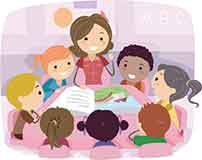Divya Choudary
How many of us are actually open to feedback? Positive comments, yes, all of us, but criticism? As teachers, it is important to get feedback every now and then. In the recent years and with the introduction of CCE, assessment and evaluation of students has become an important aspect of teaching. Assessment of teachers and self-evaluation is equally, if not more, important. One may ask if it is a teacher’s passion for the subject or their educational qualifications that needs to be considered. For teachers, the challenge lies in not just knowing the subject, but teaching it well to a classroom of 40 odd students. One also has to evaluate one’s interactions with students and other teachers in the school.
Here are a few ways you can go about getting feedback:
 From the best source — the students themselves!
From the best source — the students themselves!
A great way to ensure you are building an effective classroom is to find out from your students themselves whether they find it effective! You can ask the students for their feedback at the end of the term, or at the end of every topic you cover. With the latter, you will get continuous feedback and will be able to modify your future lesson plans to better suit their needs.
The first time I had a teacher ask me to share my views on his teaching methodology and the topics covered, I remember hesitating, “Was this a trick question? Do teachers actually want our opinion?!” Since some students might not be comfortable expressing their views, you could give them a questionnaire which deals with, for example, their level of understanding of the topics taught, the effectiveness of the approach used by you, the areas where they faced difficulty or needed more time from you, and what they liked about a particular learning activity.
You could also engage your students in a discussion in the classroom, to give them the time and space to voice their opinions and also discuss ways in which these issues can be addressed. A simple question to get the discussion off the ground is, “What kind of teacher would you want?” You could ask the students to write their answers anonymously on post-it slips and display them in the classroom. Engaging the students and making it clear to them that their input matters will help establish a positive learning environment and strengthen the teacher-student relationship. You, the teacher will also get a better idea of what your students hope for.
 From the parents
From the parents
Most parent-teacher meetings are organized to discuss the progress of the student. These meetings are also a good time to get parents’ feedback on your teaching methodology. What do parents want from teachers? Has there been any significant change in the level of a child’s skills and learning after a particular activity? What do parents find that the children “take home” from the classroom? Discussions like these will also help develop a sense of partnering with the parents to help the child. If time during these meetings does not permit this, you could try organizing a feedback discussion with the parents on your own initiative.
 From your colleagues and other teachers
From your colleagues and other teachers
With feedback from the students and parents, there is a possibility that you receive comments like “too much homework”, “very difficult exam”, “My child scored 98 per cent, I have no doubt that you are the best teacher”. To get an objective evaluation of yourself as a teacher, it helps to have other teachers share their feedback about your teaching methods. Discussing your pedagogical techniques with other teachers will be a great way to improve on them. Talking about new ideas you would like to try and sharing your experiences on techniques you have already tried will also help other teachers. If your colleagues agree, you could also observe their classes and ask them to observe yours. To make the most of this process, give your colleagues an idea of what they should look out for or what specifically you would like feedback on – can the language be clarified? Are there any redundancies to eliminate? Feedback from such observations will be very helpful.
 Self-evaluation
Self-evaluation
While opinions from students, parents, and colleagues are important, it is your evaluation of yourself, at each stage, that truly matters. You have to continuously consider what it takes to be a “good” teacher. How aware are you of the current trends and interests in your students’ lives? How up-to-date are you on the technology that today’s children are so comfortable with? Are your techniques reaching all the students, even the less motivated ones? Are you still passionate about teaching, about your subject, and about learning as well? These are just a few questions that teachers must internalize. There are many websites with questionnaires and checklists for teachers to fall back on, like http://www.docs.hss.ed.ac.uk/iad/Learning_teaching/Tutors/Handbook/Tutors-Chapter10.pdf.
Communication is a key factor in making progress happen. Encouraging students, parents, and your colleagues to give you feedback on your classroom instruction and being open to their suggestions can lead to a better, more effective pedagogical practice.
